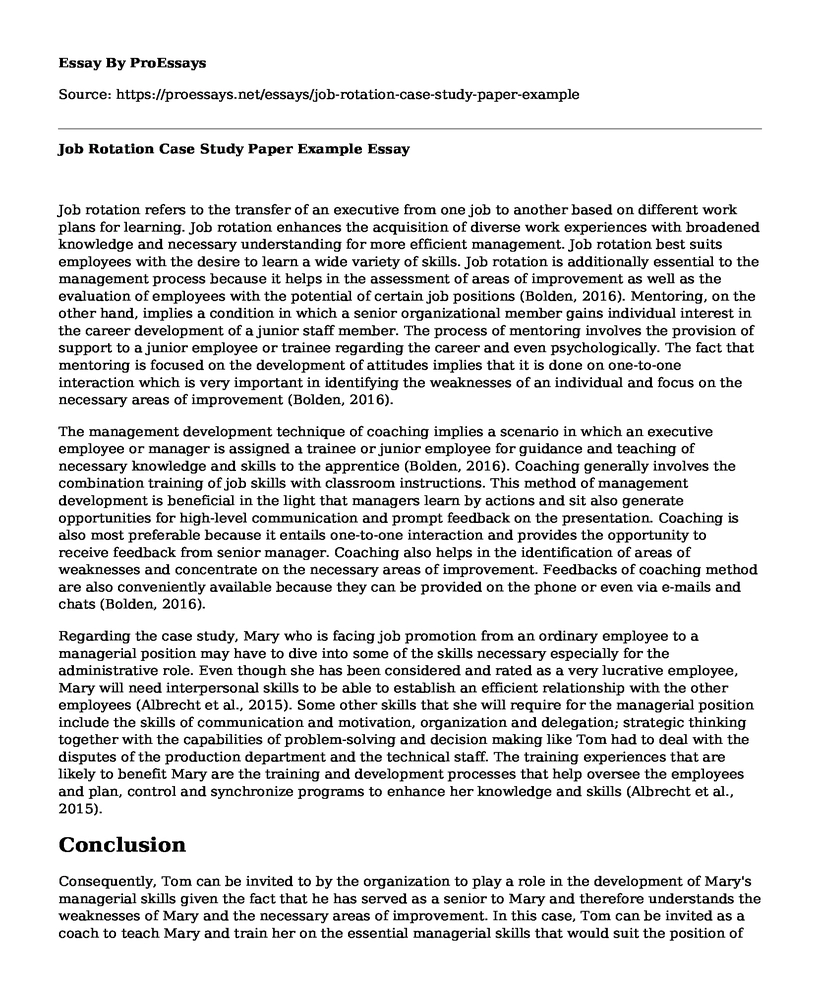Job rotation refers to the transfer of an executive from one job to another based on different work plans for learning. Job rotation enhances the acquisition of diverse work experiences with broadened knowledge and necessary understanding for more efficient management. Job rotation best suits employees with the desire to learn a wide variety of skills. Job rotation is additionally essential to the management process because it helps in the assessment of areas of improvement as well as the evaluation of employees with the potential of certain job positions (Bolden, 2016). Mentoring, on the other hand, implies a condition in which a senior organizational member gains individual interest in the career development of a junior staff member. The process of mentoring involves the provision of support to a junior employee or trainee regarding the career and even psychologically. The fact that mentoring is focused on the development of attitudes implies that it is done on one-to-one interaction which is very important in identifying the weaknesses of an individual and focus on the necessary areas of improvement (Bolden, 2016).
The management development technique of coaching implies a scenario in which an executive employee or manager is assigned a trainee or junior employee for guidance and teaching of necessary knowledge and skills to the apprentice (Bolden, 2016). Coaching generally involves the combination training of job skills with classroom instructions. This method of management development is beneficial in the light that managers learn by actions and sit also generate opportunities for high-level communication and prompt feedback on the presentation. Coaching is also most preferable because it entails one-to-one interaction and provides the opportunity to receive feedback from senior manager. Coaching also helps in the identification of areas of weaknesses and concentrate on the necessary areas of improvement. Feedbacks of coaching method are also conveniently available because they can be provided on the phone or even via e-mails and chats (Bolden, 2016).
Regarding the case study, Mary who is facing job promotion from an ordinary employee to a managerial position may have to dive into some of the skills necessary especially for the administrative role. Even though she has been considered and rated as a very lucrative employee, Mary will need interpersonal skills to be able to establish an efficient relationship with the other employees (Albrecht et al., 2015). Some other skills that she will require for the managerial position include the skills of communication and motivation, organization and delegation; strategic thinking together with the capabilities of problem-solving and decision making like Tom had to deal with the disputes of the production department and the technical staff. The training experiences that are likely to benefit Mary are the training and development processes that help oversee the employees and plan, control and synchronize programs to enhance her knowledge and skills (Albrecht et al., 2015).
Conclusion
Consequently, Tom can be invited to by the organization to play a role in the development of Mary's managerial skills given the fact that he has served as a senior to Mary and therefore understands the weaknesses of Mary and the necessary areas of improvement. In this case, Tom can be invited as a coach to teach Mary and train her on the essential managerial skills that would suit the position of the manager of the productions department. Management education programs would be useful in the case of Mary because the training program would equip her with the necessary skills that are appropriate for her new role in the company. The disadvantage of undergoing management education programs is that they would be expensive and time-consuming (Albrecht et al., 2015). However, Mary can also experience management training programs especially the on-the-job development programs like coaching which can be facilitated by Tom. Coaching would be less expensive, and it can be done while Mary is on duty as the manager even though she will lack training skills.
References
Albrecht, S. L., Bakker, A. B., Gruman, J. A., Macey, W. H., & Saks, A. M. (2015). Employee engagement, human resource management practices and competitive advantage: An integrated approach. Journal of Organizational Effectiveness: People and Performance, 2(1), 7-35.
Bolden, R. (2016). Leadership, management, and organizational development. In Gower handbook of leadership and management development (pp. 143-158). Routledge.
Cite this page
Job Rotation Case Study Paper Example. (2022, Oct 23). Retrieved from https://proessays.net/essays/job-rotation-case-study-paper-example
If you are the original author of this essay and no longer wish to have it published on the ProEssays website, please click below to request its removal:
- Global Jurisdictions Affect Decision Makers in Balancing Social Economic Interests With Environmental Interests?
- Research Paper on Women Leadership in Kuwait
- Effective Program Management: DHA's Strategy for Organization
- Successful Leaders: Developing Leadership Styles for Success - Essay Sample
- Essay on Regulating Social Media Usage in Professional Settings: Balancing Performance & Behaviour
- U.S. Jobs Record Streak: African Americans Fare Worse - Essay Sample
- Essay Example on 29% Profit Increase: My Journey in Retail Marketing







